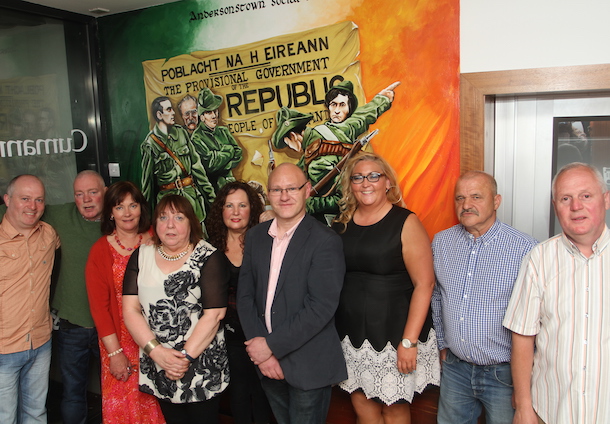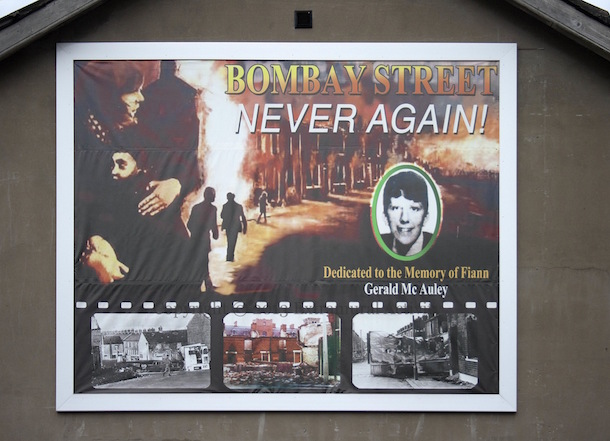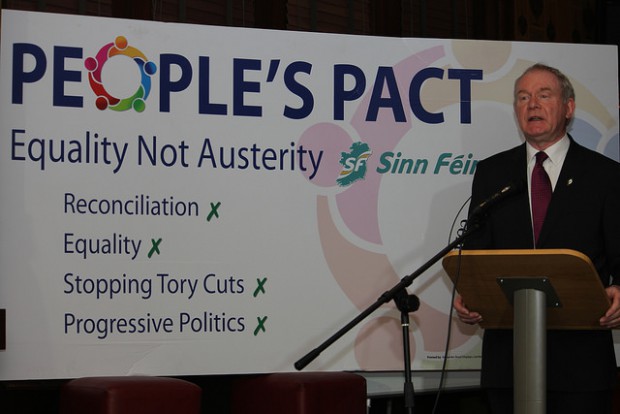5 May 2015
Bobby Sands, inspired by the vision of the Proclamation of Easter Week 1916
Bobby Sands Memorial Lecture 2015

● Junior Minister Jennifer McCann (third from left), a friend of Bobby Sands and MLA for Twinbrook who chaired the memorial lecture, with Paul Maskey and members of the Colin Memorial Committee
BOBBY SANDS, Sinn Féin West Belfast MP Paul Maskey said delivering the 2015 Bobby Sands Memorial Lecture at the weekend, valued the concept of freedom enshrined by the Proclamation of Easter 1916. He never doubted that this would be achieved, Paul Maskey said.
Bobby Sands wrote: “I may die but the Republic of 1916 will never die. Onward to the Republic and the liberation of our people.” Bobby did sadly die in the prison hospital of the H-Blocks on the 5th of May 1981 after 66 days on hunger strike “but the fulfilment of his prophesy remains the central point of the political existence of all of us here and of republicans throughout this country and beyond”, Paul Maskey said.
He continued:
“The Republic declared in Easter Week 1916 has never been closer and as we consider the turmoil that has been introduced to the lives of hundreds of thousands of Irish people by the greed of a few.
“When we consider the desperate circumstances brought on by the merchants of austerity we might argue that the moral decency and humanity brought to life by the words of the Proclamation of 1916 has perhaps never been more necessary.
“Onward to the Republic and the liberation of our people – Bobby's words but our responsibility. Everything that has passed before has taken us to where we are today. Our people have paid such a heavy price that the thought of us not succeeding cannot be considered.”

Paul Maskey said that it was only when he was writing his speech that he revisited the description of the Hunger Strikers as “ordinary people living in extraordinary times”.
“Was Bobby Sands an ordinary person? He probably would have answered yes. He might have pointed to his childhood in the Rathcoole estate on the outskirts of north Belfast, or his life in the Twinbrook area where the family settled, having been forced by loyalists from their Rathcoole home. And, sure enough, you can find nothing out of the ordinary, in the case of the North of Ireland, about his working-class background. ”There was nothing ordinary though about his partitioned country.
“Nothing ordinary about the manner in which Catholic people were treated in the Six Counties.
“There was nothing ordinary about the response of the Northern state to Catholic demands for a modest implementation of civil rights.
“There was nothing ordinary about the conflict that subsequently ensued.
“Nothing ordinary about the manner in which Bobby faced adversity, whether on the street or as a prisoner of war.
“There was nothing ordinary about his death on hunger strike.
“Bobby and his fellow H-Block martyrs were anything but ordinary. They were totally exceptional human beings and are remembered as such the world over.”
The North that Bobby Sands and his comrades were born into and grew up in was “a nakedly sectarian statelet founded on discrimination and maintained by discrimination”, Paul Maskey said.
Members of the Catholic community were effectively accorded the status of second-class citizenship to create the illusion that working-class unionists were being rewarded for their loyalty, Paul Maskey said.
“In actual fact, all they were being afforded was a better chance of securing a job than their Catholic counterparts and preferential treatment when it came to the allocation of social housing.
“Electoral boundaries were gerrymandered to ensure unionist control of councils in areas where nationalist majorities prevailed. From these councils, so-called democratic unionist politicians were able to fit the nuts and bolts at a local level to the sectarian ethos of the government at Stormont.
“The legal and judicial system and Civil Service shared the outlook of the political establishment while a fiercely sectarian RUC established primarily to defend the state excelled in the persecution of Catholic, nationalist and republican citizens or indeed anyone deemed a threat to the state.
“Throughout its history, the Northern state has been marked by sectarian pogroms, inequality and conflict. The former making the latter inevitable. Some revisionists continue to claim that none of these things really happened and that everything was fine until republicans inexplicably turned nasty and initiated a war. These people conveniently ignore the fact that all parties to the Good Friday Agreement – including the Irish and British governments - acknowledged that conflict was the net product of wholly untenable political, social and cultural conditions. They identified many of these conditions and set out a framework aimed at addressing and correcting these.”

Bobby Sands was as much a visionary as any of our patriot dead from any period in the history of the republican struggle, Paul Maskey maintained.

“He had a clear vision of the type of society he wanted to see created. His efforts to promote the Irish language and culture along with the work that he did to improve living conditions in the Twinbrook area demonstrate a desire to enrich the lives of the people around him and to empower those considered powerless.
“His mission was about doing what could be done in difficult circumstances to improve the quality of life of the people he lived among.
“Ultimately though, he knew that in this partitioned country, and in this part of the island – where every significant decision affecting the lives of local people is made by a government in England that we do not elect; a government that cares nothing about our needs and concerns – the only way life can be radically improved is by breaking free from British rule. And so Bobby Sands became a freedom fighter.”

For people living in the Six Counties, and particularly nationalist people, the price of partition, the price of the Union, the price of British rule has been adversity, Paul Maskey reminded his audience. But he added:
“The political terrain has changed almost beyond recognition over the past couple of decades and republicans have been central to forging change, but the fact remains that in the absence of national sovereignty we will continue to face and battle adversity.
“For republicans, therefore, national reunification and independence is much more than an abstract aspiration, it is an imperative. It is about building a nation on this island. It is about giving life to the sentiments enshrined in the Proclamation of 1916.”
Paul Maskey ended:
“On Sunday 1 March 1981, on the first day of his hunger strike, Bobby Sands wrote: 'What is lost here is lost for the Republic.' Using similar reasoning, we can assert that what we gain today is gained for the Republic.
“Thirty-four years ago, as Bobby Sands's life was nearing an end, British Prime Minister Margaret Thatcher predicted that republicans were playing their last card. Margaret Thatcher badly misread the situation because the courage and sacrifice of Bobby Sands and his fellow Hunger Strikers, and the courage and sacrifice, ingenuity and determination of republicans in the period since, has seen the deck stacked in our favour.
“The last of the cards will soon find their way to the table and, when they do, the Republic that has sat beyond the reach of previous generations will become a reality for today’s generation.”
Follow us on Facebook
An Phoblacht on Twitter
Uncomfortable Conversations

An initiative for dialogue
for reconciliation
— — — — — — —
Contributions from key figures in the churches, academia and wider civic society as well as senior republican figures




